
The Financial Situations Best Suited For Chapter 7 Bankruptcy Chapter 7 bankruptcy is ideal if you’re an individual or household who faces overwhelming debt with no realistic way of repaying it. Undoubtedly, income level plays a role, but high-income earners can still qualify if their expenses and debts exceed their ability to pay. Here are some common scenarios where Chapter 7 might be the best option for you: Unmanageable Debt If you're unable to develop a feasible plan to repay significant credit card balances, medical bills, or personal loans, Chapter 7 can provide relief. No Viable Repayment Plan Many of my clients tend to approach bankruptcy when they recognize they lack a realistic method to service their debts despite their willingness to try. Frequent Financial Crunch Persistent struggles to meet monthly obligations like rent, utilities, or food due to debt servicing indicate Chapter 7 may be necessary. Low Assets People who do not have substantial assets, such as a second home or luxury vehicles, may find Chapter 7 particularly beneficial since it allows for asset exemptions. Alternatives To Chapter 7 Bankruptcy Before filing for Chapter…Read More
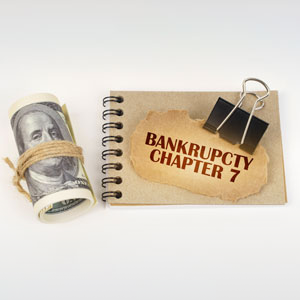
Evaluating Assets In Chapter 7 Bankruptcy In a Chapter 7 bankruptcy, your assets are evaluated to determine what you can keep and what may need to be sold to pay creditors. Each state has specific exemptions, which dictate what property is protected. For example, in Iowa, you can keep 100% of the equity in your home, which is a significant benefit compared to states like Missouri, where you might only keep a portion, such as a cap of $15,000 of the home’s equity. The process begins by listing all your assets, including cars, real estate, bank accounts, and retirement accounts, among other things. Then, exemptions are applied based on state law to determine what you're allowed to keep. Items that exceed the exemption limits like luxury vehicles or recreational items, such as boats might have to be turned over to the bankruptcy trustee or sold to pay off creditors. However, careful planning and understanding of exemptions can help protect some of these assets. The key is to ensure that your assets are organized properly to maximize the protections offered by your state’s laws. At-Risk Assets…Read More
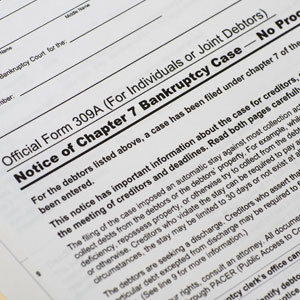
Necessary Documentation When Filing For Chapter 7 Bankruptcy When planning to file for Chapter 7 bankruptcy, there are a few essential documents you should gather. We typically request six months of pay records, three months of bank statements, and two years of tax returns from all of our clients. These form the core of the financial snapshot we need. Additionally, while we often obtain debt information through your credit report, certain debts such as medical bills won’t appear there. Recently, medical debts have been excluded from credit reports entirely, so we will need to gather those records separately along with any other debts that don't show up. After our review, we provide a list of creditors, and it’s important for the client to verify any missing creditors that we may need to include. Fees When filing for Chapter 7 bankruptcy, there are a few types of fees involved. First, you’ll have an attorney fee, though I’d prefer not to provide a specific amount since fees can change and the rate could be different by the time you're ready to file. Besides that, there’s a credit…Read More

Basic Eligibility Requirements To file for Chapter 7 bankruptcy, one of the key eligibility factors is determining your ability to pay your debts. Typically, you must either earn less than the median income for your state and family size or show that your monthly expenses exceed your monthly income. This helps to establish whether you're financially eligible to discharge your debts through Chapter 7, rather than a repayment plan under Chapter 13. No specific debts make you ineligible to file for Chapter 7 bankruptcy, but certain debts are non-dischargeable. For example, student loans are generally not dischargeable, though there are rare exceptions. Certain taxes can be discharged, while others cannot, and debts related to willful and malicious injuries are non-dischargeable. Fraudulent acts and obligations like child support and alimony also cannot be discharged. While you can still file for Chapter 7, these debts would remain after the bankruptcy process. The Means Test The Means Test is a tool used to determine eligibility for Chapter 7 bankruptcy. In 2005, Congress, led by Senator Grassley, passed the Bankruptcy Abuse Prevention and Consumer Protection Act (BAPCPA), which introduced…Read More
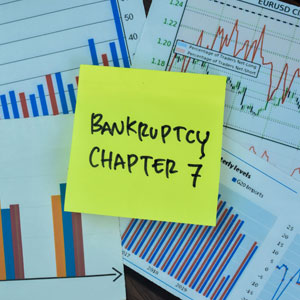
Unpacking Chapter 7 Bankruptcy Chapter 7 bankruptcy in Iowa is designed for individuals seeking a financial reset. This process involves discharging eligible debts, which allows the filer to start anew. The primary focus is determining the filer’s ability to repay debts. If there’s insufficient income or resources to cover debts, Chapter 7 is often the best route. In contrast, Chapter 13 bankruptcy is for individuals who have some ability to repay their debts. This type involves creating a repayment plan to pay back all or part of the debt over time, typically three to five years. The distinction lies in the debtor’s financial capacity and the approach to debt resolution. Advantages And Risks Chapter 7 bankruptcy offers significant advantages, especially for those seeking prompt resolution. One benefit is the complete discharge of qualifying debts, such as medical bills or credit card debt, providing a clean financial slate. More than this, the process is relatively quick—typically taking about 90 days from start to finish—compared to Chapter 13, which involves a repayment plan lasting three to five years. For those who qualify, Chapter 7 is often the…Read More
On August 24, 2022, the office of the President announced a new federal student loan forgiveness plan. This action aims to cancel out certain amounts of student loan debt through an executive order. There are many details still forthcoming, and reports of what and when it will happen once President Biden signs have been varied. As a service to our clients and others in the community we will be researching this topic and staying current with developments. Please call our office at [number] with any questions or for updates we might have. Be sure to check back often for updates posted here as well.Read More

Johnston, Iowa, in Polk County, is one of several thriving cities that make up the Des Moines metroplex. The residents of Johnston, Iowa have trusted Marks Law Firm for over 20 years to help protect important assets through both Chapter 7 and Chapter 13 bankruptcies. They know that bankruptcy can help stop repossession efforts, garnishments and save other valuable assets from collection efforts. If a repossession is looming because you are behind on a car loan payment, then you may need to bring them current for a Chapter 7 to be viable. This is something you and one of our experienced attorneys will discuss in-depth before deciding what option is best for you. If Chapter 7 bankruptcy is the best path for you to regain financial stability, reaffirming the vehicle loan and continuing to make the payments until it is paid off will be the plan of action your attorney recommends. “Reaffirmation” is a process of making an agreement between the lender, you, and your attorney to verify budget numbers and let the Court know of your desire to keep the vehicle. Simply put, this…Read More
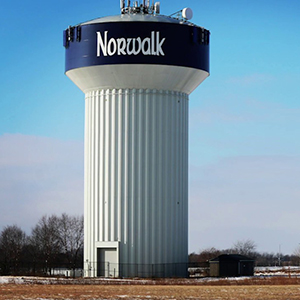
The people of Norwalk in Warren County, Iowa enjoy some of the best of what Iowa has to offer by combining a short commute to Des Moines for work and play with a quiet home life in one of the most rapidly growing suburbs in the Metro area. They also have come to depend on Marks Law Firm to provide experienced advice in the complex area of bankruptcy. When they have questions the people of Norwalk choose Marks Law Firm to answer those questions and provide accurate information on the advantages of having a bankruptcy help you start over financially and stop the harassing calls from creditors. One of the biggest benefits of filing a Chapter 7 or Chapter 13 bankruptcy is that it provides relief from the stress of being in debt and the collection. The constant worrying about losing your residence, your automobile, and other valuable assets can be devastating and overwhelming. The never-ending calls from creditors are undoubtedly the worst part of struggling to meet your financial obligations. It can feel like harassment regardless of how respectfully the creditor communicates. When you…Read More
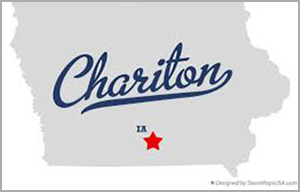
Chariton, Iowa has a long tradition of family values and hard work associated with its name. Marks Law Firm has helped many of Chariton’s residents file for Chapter 7 bankruptcy protection through the years. This has led to the hard-working people of Chariton (and Lucas County, Iowa) regaining their financial freedom and freeing themselves from creditors calling night and day. It also can stop the repossession of valuable assets. As soon as you file a Chapter 7 bankruptcy, the court appoints a trustee whose job it is to find assets that can be used to pay all or part of your debt. You really want the trustee to not be able to find any assets, or certainly not much for assets. The best way to keep your assets away from the trustee is to claim them as exempt. What you can claim as exempt and how much is obviously very important. In Iowa, you have certain items your attorney can help you protect. Here are a few typical items: Common Household Goods (You get to keep your pots and pans!) Tools of the Trade (If…Read More

Osceola, Iowa is a quaint town in Clarke County only 35 miles south of Des Moines with a beautiful historic downtown. Its residents take pride in their community and Marks Law Firm has been helping them with questions and concerns about bankruptcy for over 20 years. If you find yourself knee-deep in debt, you deserve to know that you are not in the minority. Each year, thousands of Iowans just like you and I end up with crippling debt and the need to file Chapter 7 Bankruptcy. Resetting your financial life is not as hard as you think. Once you can come to terms with the “b” word, the actual process of filing Chapter 7 Bankruptcy is simple with the help of our experienced attorneys. Step 1: Schedule a free consultation with our office. For your convenience, we offer both in-person and telephonic consultations. Call our office at [number] to find the best solution for you. Step 2: Based on your individual case, we will make a list of documents we need from you and actions for you to take to get ready to file…Read More